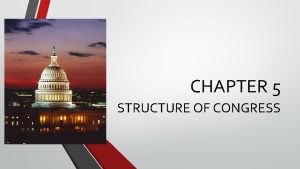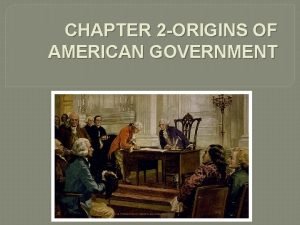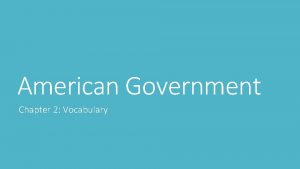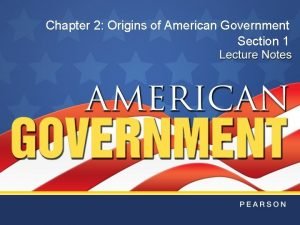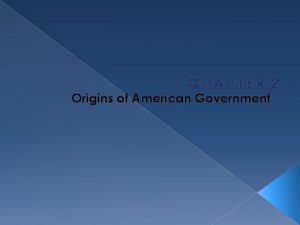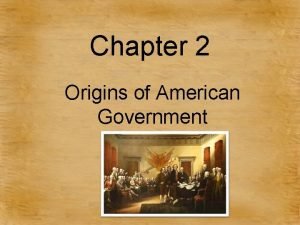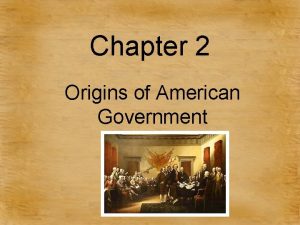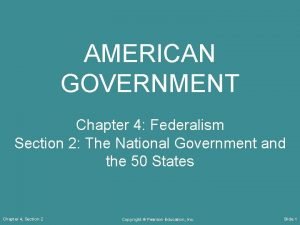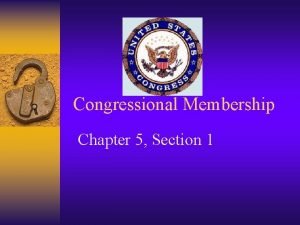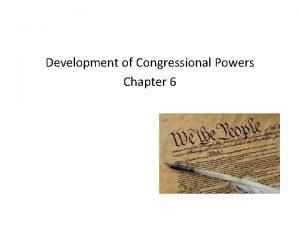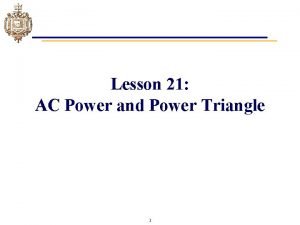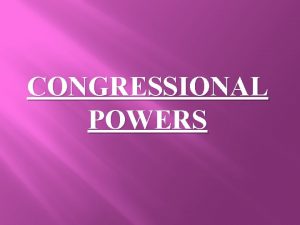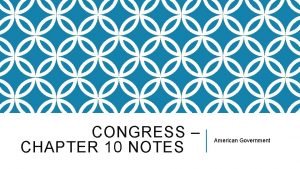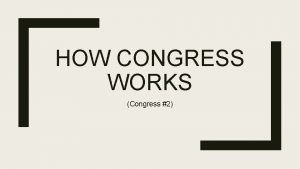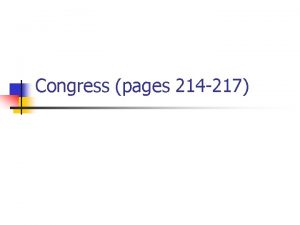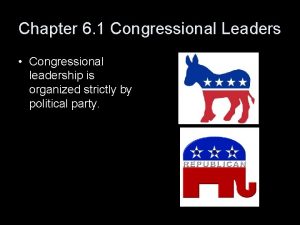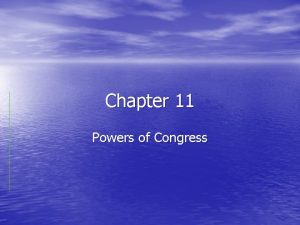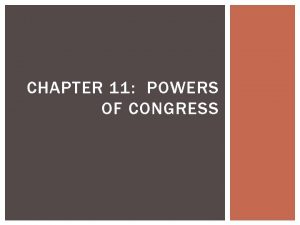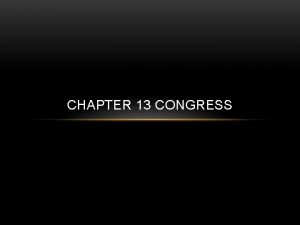AMERICAN GOVERNMENT Chapter 11 Notes Congressional Power Congress












- Slides: 12

AMERICAN GOVERNMENT Chapter 11 Notes

Congressional Power ◦ Congress only has those powers delegated to it by the Constitution. ◦ The powers of Congress are categorized in 3 areas: ◦ Expressed powers – written in the Constitution ◦ Implied Powers – by reasonable deduction from the expressed powers ◦ Inherent Powers – those powers typically set aside for national governments

Strict v. Liberal Constructionists ◦ Much of the early conflict in U. S. politics centered on the powers of Congress. ◦ The strict constructionists were led by Thomas Jefferson; they believed that Congress should only be able to exercise the expressed powers and those implied powers absolutely necessary to carry out the expressed powers. ◦ The liberal constructionists were led by Alexander Hamilton; they favored a very liberal interpretation of the powers given to Congress.

Expressed Powers ◦ Most of the expressed powers are found in Article I, Section 8 of the Constitution. ◦ There are 18 separate clauses and 27 different powers explicitly given to Congress. ◦ The Constitution gives Congress the power to tax; however, Congress’ power to tax is NOT unlimited. ◦ ◦ ◦ Congress cannot tax church services Congress cannot implement a poll tax Congress may tax only for public, not private, purposes. Congress may NOT tax exports. Taxes must be levied at the same rate in all states

Expressed Powers ◦ Borrowing Power ◦ Commerce Power – power to regulate trade ◦ Currency Power ◦ Foreign Relations Power – act on matters of national security (immigration and measures to combat terrorism) ◦ War Powers – war and national defense – Only Congress can declare war! ◦ Naturalization

Expressed Powers ◦ Postal Power ◦ Copyrights and Patents ◦ Weights and Measures – absolute need for accurate, uniform gauges of time, distance, area, weight, volume, etc. ◦ Judicial Powers – create all federal courts below the Supreme Court and define federal crimes and punishments for violations of federal law

Implied Powers ◦ The Constitutional basis for the implied powers is found in one of the expressed powers “Necessary and Proper Clause” ◦ Mc. Culloch v. Maryland 1819 ◦ Congress created Second Bank of the United States ◦ There was a branch of the Second Bank in Baltimore, Maryland ◦ State of Maryland placed a tax on all bank notes issued by banks not chartered in the state of Maryland ◦ James Mc. Culloch was the bank’s head cashier – he purposely issued notes on which no tax was paid

Mc. Culloch v. Maryland 1819 (continued) ◦ The state of Maryland sued James Mc. Culloch ◦ The U. S. appealed to the Supreme Court on his behalf ◦ Maryland argued that the creation of the bank was unconstitutional ◦ The Supreme Court sided with Mc. Culloch – the creation of the Second Bank was ‘necessary and proper’ based on the expressed powers give to Congress of: taxing, borrowing, currency, and commerce.

Non-Legislative Powers ◦ Electoral Duties ◦ House of Representatives may be called upon to elect a President if no candidate receives a majority of the electoral votes ◦ It chooses between the 3 highest contenders, and each state gets one vote – majority wins ◦ Constitutional Amendments ◦ Congress may propose an amendment to the Constitution with a 2/3 vote in each house of Congress

Non-Legislative Powers ◦ Impeachment ◦ The Constitution provides that the President, Vice-President, and all civil officers of the U. S. may be removed from office thru impeachment. ◦ The House has the sole power to impeach, or accuse or bring charges – only a majority vote is required ◦ The Senate serves as the judge and jury. There must be a 2/3 majority in the Senate to convict. The penalty for conviction is removal from office.

Impeachment of Presidents ◦ Only 2 Presidents have been impeached: ◦ Andrew Johnson in 1868 ◦ Bill Clinton in 1998 ◦ Both were acquitted, or found not guilty by the Senate ◦ Richard Nixon resigned in the face of almost certain impeachment in the Watergate Scandal. He resigned in 1974.

What was Watergate? ◦ A June, 1972 attempt by Republican operatives to break in to the Democratic Party’s national headquarters in the Watergate office complex in Washington, D. C. ◦ President Nixon had ignored several subpoena requests for tape recordings of Watergate-related conversations in the Oval Office. ◦ It was apparent that the House would impeach him and that the Senate would convict him. Facing almost certain impeachment, Nixon resigned on August 9, 1974.
 Lesson 5 staff and support agencies
Lesson 5 staff and support agencies Lesson 1 congressional membership
Lesson 1 congressional membership Chapter 2 american government
Chapter 2 american government Chapter 2 origins of american government vocabulary
Chapter 2 origins of american government vocabulary Chapter 2 origins of american government answer key
Chapter 2 origins of american government answer key Chapter 2 origins of american government worksheet answers
Chapter 2 origins of american government worksheet answers Chapter 2 lesson 1 government in colonial america
Chapter 2 lesson 1 government in colonial america Chapter 2 origins of american government
Chapter 2 origins of american government American government chapter 4
American government chapter 4 Chapter 5 section 1 congressional membership
Chapter 5 section 1 congressional membership Development of congressional powers chapter 6 answer key
Development of congressional powers chapter 6 answer key Development of congressional powers chapter 6 answer key
Development of congressional powers chapter 6 answer key Draw the power triangle
Draw the power triangle

